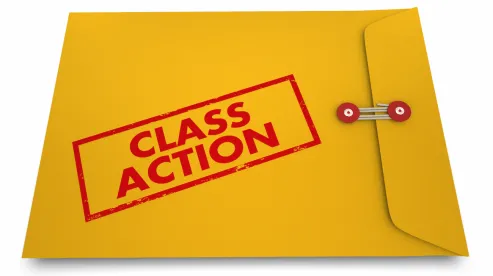The novel coronavirus (“COVID-19”) has caused severe business disruptions throughout Massachusetts. Many companies doing business in Massachusetts have been forced to indefinitely shut their doors, while others are facing supply problems or decreased product demand. In addition to navigating these choppy economic waters, business leaders must also consider the risks likely to follow the current crisis.
One such risk is class action litigation challenging actions taken (or not taken) in response to the pandemic. COVID-19-related class actions will likely impact all types of businesses and cover a wide range of activity, including, among other things, consumer-initiated claims, employment-related claims, and business-to-business claims. As a result, many businesses that never faced class litigation pre-pandemic may find themselves for the first time defending class claims in Massachusetts courtrooms.
For some businesses, the future is now. Just weeks into the pandemic, a class action was filed in Massachusetts federal court against a chain fitness club, alleging it unfairly and deceptively charged monthly membership fees while its clubs were closed due to COVID-19, and thus violated the Massachusetts consumer protection statute, Mass. Gen. Laws ch. 93A (“Chapter 93A”). [1] Other businesses, like those engaged in consumer debt collection, may find themselves on the wrong side of emergency government regulations or enforcement priorities calibrated to the current state of emergency, which may present attractive areas for private class claims. [2] Accordingly, business leaders should brush up on key strategies that can be used to defend class claims brought in Massachusetts.
STRATEGIC CONSIDERATIONS FOR DEFENDING CLASS ACTIONS IN MASSACHUSETTS
Forum: At the foundation of any class action defense is identifying the most favorable court forum available. The specific forum in which a case is litigated can have important implications on the available defense strategies, with Massachusetts federal court typically providing a more favorable avenue than state court for defending class actions and, in particular, defeating motions for class certification. Defendants facing non-removable class claims in Massachusetts state court should not despair, however, as state law also provides robust defenses to class certification.
Standing: A named plaintiff in a putative class action in federal court must establish standing under Article III of the U.S. Constitution. [3] Standing is a commonly-utilized defense at both the motion to dismiss stage and the class certification stage. [4] To have standing, a plaintiff must, at a minimum, have suffered an injury in fact that is both (1) concrete and particularized and (2) traceable to the conduct of the defendant. [5] If a named plaintiff cannot satisfy the standing requirements individually, that named plaintiff cannot represent the class. Although less developed, Massachusetts state law also requires a plaintiff to “‘show that the challenged action has caused [him or her] . . . injury’” to have standing to pursue a lawsuit. [6]
Chapter 93A Specific Class Certification Standard: The general rules governing certification of a putative class are similar in federal and state court and are codified at Rule 23 of the Massachusetts Rules of Civil Procedure and Rule 23 of the Federal Rules of Civil Procedure. [7] Claims alleging violations of Chapter 93A are subject to a unique certification standard. This is important because Chapter 93A broadly prohibits unfair or deceptive conduct, and provides for the recovery of actual, statutory, and treble damages, attorneys’ fees, and costs. [8] The Chapter 93A standard is also more lenient than the Rule 23 standard. [9] It should therefore come as no surprise that many class actions in Massachusetts include Chapter 93A claims. [10]
A putative class claim under Chapter 93A may be certified where the plaintiff demonstrates that “the use or employment of [an] unfair or deceptive act or practice has caused similar injury to numerous other persons similarly situated and if the court finds in a preliminary hearing that he adequately and fairly represents such other persons.” [11] This standard does not require a showing of predominance or superiority, and a plaintiff need not satisfy the Rule 23 elements to certify a class. [12] Importantly, federal courts are unlikely to apply the Chapter 93A standard and will likely scrutinize motions to certify Chapter 93A claims through the more demanding lens of Federal Rule 23. [13]
Ascertainability / Identification of Class Members: In addition to other class certification requirements, a plaintiff in federal court must establish “ascertainability.” [14] To establish ascertainability, a plaintiff must prove that the proposed class is sufficiently “definite,” such that absent class members can be identified based on objective criteria and in an administratively-feasible manner. [15] Although no Massachusetts state appellate court has formally adopted the ascertainability prerequisite, at least one state Superior Court Justice has noted that an ascertainability analysis “has much to recommend it.” [16] And, importantly, the considerations underlying ascertainability (administrative feasibility, identification of class members, and avoiding individual inquiries) are also encompassed by Massachusetts Rules of Civil Procedure 23(a) and 23(b), such that the feasibility of identifying class members is relevant to the certification analysis in state suits whether or not expressly analyzed under an ascertainability rubric. [17]
Differing Burdens of Proof: In both federal and state courts, the named plaintiff seeking class certification bears the burden of establishing each element of the applicable rules. [18] The comparison ends there as federal courts require a plaintiff to satisfy a heavier burden and more closely scrutinize motions for class certification. In federal court, the plaintiff must “affirmatively demonstrate” compliance with Federal Rule 23, by “prov[ing]” the requirements of Rule 23(a) and “satisfy[ing] through evidentiary proof at least one of the provisions of Rule 23(b).” [19] In state court, the plaintiff need only present “information sufficient to enable the motion judge to form a reasonable judgment that the class meets the relevant requirements.” [20] The plaintiff “do[es] not bear the burden of producing evidence sufficient to prove that the requirements of class certification have been met.” [21] While the state standard may be less exacting, a plaintiff’s burden is not easily satisfied. For example, a plaintiff seeking certification in Massachusetts state court faces a significant obstacle in establishing class-wide causation and injury. [22]
Causation and Injury Based Defenses: Under any certification standard, the elements of causation and injury provide notable opportunities for a class action defendant. [23] Like many tort-based claims, Chapter 93A has a causation and an actual injury requirement, and thus a plaintiff must show that putative class members have suffered “similar” injuries as a result of a defendant’s allegedly unfair or deceptive conduct and “must show that they can establish causation of such similar injuries on a class wide basis.” [24] These elements present a high hurdle for plaintiffs seeking certification of Chapter 93A claims. [25] Causation and injury similarly provide critical defenses for class claims under the Rule 23 “predominance” and “superiority” requirements, because “a certification that fails under [Chapter] 93A would fail under the requirements of [R]ule 23 as well.” [26]
CONCLUSION
As businesses operating in Massachusetts navigate uncharted waters during and in the wake of the COVID-19 pandemic, disruption will come in many forms. One likely disruptor will be class action litigation that challenges actions taken in response to the current crisis. Putative class actions raise the stakes as the relief sought on behalf of a class can quickly translate to bet-the-company litigation. Businesses that understand the strategies for defending and defeating class certification, whether in state or federal court, will be in a better position to mitigate the impact of these lawsuits.
For additional information regarding defending class actions in federal court, see K&L Gates’ Defense of Class Action Litigation in Federal Court, at http://www.klgates.com/defense-of-class-action-litigation-in-federal-court-11-26-2018/.
NOTES
[1] See DelVecchio v. Town Sports Intern’l, LLC, Civ. No. 20-cv-10666-MLW (D. Mass.).
[2] See 940 CMR § 35.00 (emergency regulation providing that certain debt collection practices are per se unfair and deceptive under Chapter 93A).
[3] See In re Asacol Antitrust Litig., 907 F.3d 42, 47–51 (1st Cir. 2018).
[4] Standing is among the most litigated issues in federal class actions, as attested to by the number of alerts on the K&L Gates Consumer Financial Services Watch blog. See www.consumerfinancialserviceswatch.com (type “standing” in the search function).
[5] Spokeo, Inc. v. Robins, 578 U.S. —, 136 S.Ct. 1540, 1547–48 (2016).
[6] Brantley v. Hampden Div. of the Family and Probate Ct. Dep’t, 457 Mass. 172, 181 (2010) (quoting Slama v. Attorney Gen., 384 Mass. 620, 624 (1981)).
[7] See MASS. R. CIV. P. 23; FED. R. CIV. P. 23.
[8] See MASS. GEN. LAWS CH. 93A, §§ 2, 9, 11.
[9] See Bellermann v. Fitchburg Gas and Elec. Light Co., 470 Mass. 43, 52–53 (2014) (“Bellermann I”).
[10] See, e.g., Tyler v. Michaels Stores, Inc., 464 Mass. 492, 492–94 (2013); Iannacchino v. Ford Motor Co., 451 Mass. 623, 629–34 (2008); Shaulis v. Nordstrom, Inc., 865 F.3d 1, 5 (1st Cir. 2017).
[11] See MASS. GEN. LAWS CH. 93A, §§ 9(2), 11.
[12] Bellermann I, 470 Mass. at 53; Kwaak v. Pfizer, Inc., 71 Mass. App. Ct. 293, 298 (2008).
[13] Although no federal appellate court has directly addressed the issue, relevant authority suggests that federal courts should apply the Federal Rules of Civil Procedure to motions seeking certification of Chapter 93A claims. See Shady Grove Orthopedic Assocs., P.A. v. Allstate Ins. Co., 559 U.S. 393, 416-36 (2010) (Stevens, J., concurring); Godin v. Schencks, 629 F.3d 79, 86–88 (1st Cir. 2010); Conley v. Roseland Residential Trust, NO. 18-10629-WGY, 2020 WL 1063082, at *4 n.4 (D. Mass. Mar. 5, 2020).
[14] See In re Nexium Antitrust Litig., 777 F.3d 9, 19 (1st Cir. 2015).
[15] Id.
[16] Marquis v. Google, Inc., No. SUCV 2011-02808-BLS1, 2014 WL 4180400, at *10, *15 (Mass. Super. Ct. July 27, 2014); see also Cabrera v. Auto Max Preowned, Inc., No. SUCV201601227BLS1, 2019 WL 3550579, at *4–5 (Mass. Super. Ct. June 17, 2019).
[17] See Marquis, 2014 WL 4180400, at *10 (“when class members [are] impossible to identify prior to individualized fact-finding and litigation, the class fails to satisfy one of the basic requirements for a class action under Rule 23” (internal quotation omitted)).
[18] See In re Nexium Antitrust Litig., 777 F.3d at 27; Kwaak, 71 Mass. App. Ct. at 297.
[19] Comcast Corp. v. Behrend, 569 U.S. 27, 33 (2013).
[20] Bellermann I, 470 Mass. at 51–52 (internal quotation marks omitted); Aspinall v. Philip Morris Cos., Inc., 442 Mass. 381, 392 (2004).
[21] Bellermann I, 470 Mass. at 51–52 (internal quotation marks omitted); see also Bellermann v. Fitchburg Gas and Elec. Light Co., 475 Mass. 67, 71 (2016) (“Bellermann II”).
[22] See Bellermann II, 475 Mass. at 71–78; Bellermann I, 470 Mass. at 53–54; Kwaak, 71 Mass. App. Ct. at 298–301; Tyler, 464 Mass. at 503–04; Morgan v. Mass. Homeland Ins. Co., 91 Mass. App. Ct. 1, 5–7 (2017).
[23] See Bellermann I, 470 Mass. at 53–54.
[24] Id. at 54; Aspinall, 442 Mass. at 397 n.19.
[25] See Bellermann I, 470 Mass. at 53–54; Kwaak, 71 Mass. App. Ct. at 298–301.
[26] Kwaak, 71 Mass. App. Ct. at 298 (internal quotation marks omitted).





 />i
/>i

